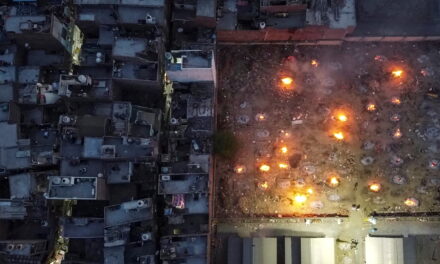Strengthening the Democracy


Harsh Bansal
“If liberty means anything at all, it means the right to tell people what they do not want to hear”
Earlier this month, the Delhi High Court granted bail to student activists Asif Iqbal Tanha, Devangana Kalita, and Natasha Narwal. They were slapped with stringent provisions of the Unlawful Activities Prevention Act (“UAPA”), 1967, and were under detention for a year. They were arrested for allegedly inciting violence among masses which led to violent protests in North-East Delhi against the Citizenship (Amendment) Act, 2019 (“CAA”) and the National Register of Citizens (“NRC”). Since its inception, UAPA has been used to suppress dissent and oppress dissidents which worsened during the first and second term of the Modi government. After the 2019 amendment, the most common victims of this draconian law are intellectuals, students, professors, journalists, and civil libertarians.
According to the National Crime Records Bureau data, there has been a whopping 165% increase in UAPA arrests between 2016 and 2019. Increase in arrests due to the vague wording of the act and unhindered usage to suppress dissenters. According to the data presented by the Union Home Ministry in Rajya Sabha, during 2016-2019 minuscule 2.2% of those arrested were convicted or found guilty (132 out of 5992). Misuse of this act is not attached to a single party, it has been misused by every party in power, but during this government, it increased manifolds.
Section 43-D (5) of UAPA makes bail nearly impossible due to its stringent conditions and provisions. This section goes against the settled norm of ‘Bail is the rule, jail is the exception’ and makes Jail a rule and bail an exception which inflicts immense pain and damage to an accused even before the trial is commenced.
In the landmark bail order, Delhi High Court granted bail to these student activists. Justices Siddharth Mridul and Anup Jairam Bhambhani took cognizance of recent trends of incarcerating individuals and labeling them as ‘terrorists’. In a well-worded bail order, HC observed that “We are constrained to express, that it seems, that in its anxiety to suppress dissent, in the mind of the State, the line between the constitutionally guaranteed right to protest and terrorist activity seems to be getting somewhat blurred. If this mindset gains traction, it would be a sad day for democracy.”
The definition of terrorism according to UAPA is very different from the definition provided by the United Nations. United Nations in its 1566 (2004) Security Council resolution called on all States to cooperate fully in the fight against terrorism and, in doing so, to prevent and punish acts that have the following three cumulative characteristics:
(a) Acts, including those against civilians, committed with the intention of causing death or serious bodily injury, or the taking of hostages;
(b) Irrespective of whether motivated by considerations of a political, philosophical, ideological, racial, ethnic, religious, or other similar nature, also committed to provoke a state of terror in the general public or a group of persons or particular persons, intimidating a population, or compelling a government or an international organization to do or to abstain from doing any act;
(c) Such acts constituting offences within the scope of and as defined in the international conventions and protocols relating to terrorism.
According to the Special Rapporteur, Terrorism can be distinguished from other crimes or warfare by its use of deadly or otherwise serious violence against “civilians”. UN Security Council resolution 1456 of January 2003 states that “States must ensure that any measure taken to combat terrorism must comply with all their obligations under international law, in particular, international human rights, refugee and humanitarian law”.
Justices in the detailed judgment quoted a Supreme Court judgment: “The Hon’ble Supreme Court says that the effect of terrorist activity must be such that it travels beyond the capacity of the ordinary law enforcement agencies to deal with it under the ordinary penal law.” So, now the question arises, can a mere act of protesting be termed as an act of ‘Terrorism’? Though terrorism is not defined in many jurisdictions, Article 141 of the Indian Constitution states that the law declared by the Supreme court is valid and binding. Apex court in dozens of cases has defined the scope of terrorism and laid down preconditions for arrests and bail. The Supreme Court in People’s Union for Civil Liberties(“PUCL”) & Anr. vs. Union of India observed that “Terrorist acts are meant to destabilize the nation by challenging its sovereignty and integrity, to raze the constitutional principles that we hold dear, to create a psyche of fear and anarchism among common people, to tear apart the secular fabric, to overthrow the democratically elected government, to promote prejudice and bigotry, to demoralize the security forces, to thwart the economic progress and development and so on”.
It is evident that demarcation of such draconian laws is needed for strengthening our democratic system. To make our democracy vibrant and thriving, we have to let critics and dissidents flourish.
Harsh Bansal is an Aspiring lawyer. (The opinions expressed in this publication are those of the author/s. They do not purport to reflect the opinions or views of The Policy Observer or our members.)
Related Articles
Privatization of Liquor: A Look Into the Loopholes of The Policy
The division of the city was done into 32 zones and licenses were based on the same. In June 2021, the tenders were issued for the application of L-7Z and L-7V licenses. The office of commission of the excise government of the national capital issued terms and conditions for the grant of licenses.
The Information Technology Rules, 2021- A Constitutional Scrutiny
A law prescribing the procedure for depriving a person of his ‘personal liberty has to meet the requirements of Article 19 and if not shall be struck down as arbitrary under Article 14. Liberties and restrictions should run parallel to each other. One overpowering the other would distort the fair working of the constitutional machinery.
Gubernatorial impropriety
The office of the Governor is slowly and steadily being converted into an extended political branch of the central government. The scale and scope this time around are more than ever before! Are we ready for the implications this will have on National Unity and the dent it will cause to the constitutional principles of Cooperative Federalism, Constitutional Morality, and Democracy?









